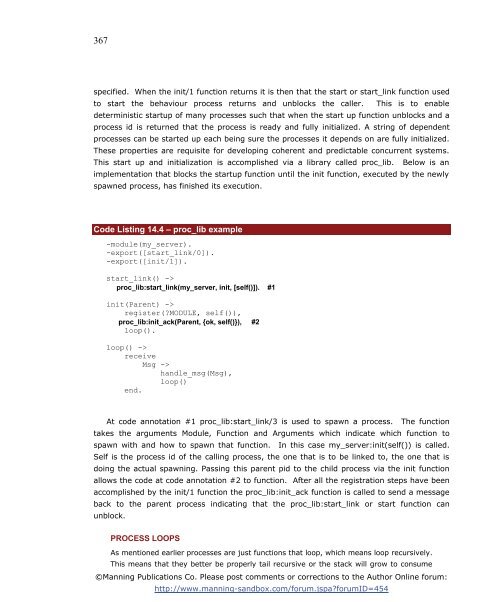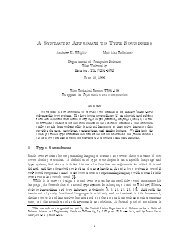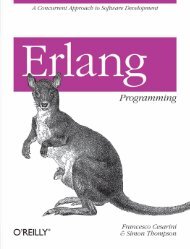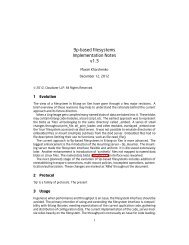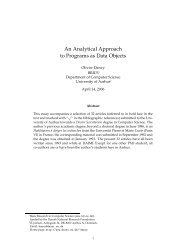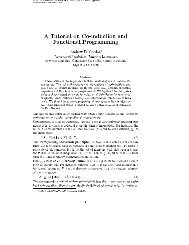- Page 2 and 3:
2 MEAP Edition Manning Early Access
- Page 4 and 5:
4 1 The foundations of Erlang/OTP W
- Page 6 and 7:
6 They are a bit like people: indiv
- Page 8 and 9:
8 This may sound strange: shouldn
- Page 10 and 11:
10 That’s all. (Although the spaw
- Page 12 and 13:
12 affecting the rest of your code
- Page 14 and 15:
14 simultaneous instances of C-like
- Page 16 and 17:
16 2 Erlang Essentials This book is
- Page 18 and 19:
18 42 2> What happened here was tha
- Page 20 and 21:
20 CALLING Q() OR INIT:STOP() The s
- Page 22 and 23:
22 User switch command --> j 1 {she
- Page 24 and 25:
24 For division, there are two choi
- Page 26 and 27:
26 in a system: currently, just ove
- Page 28 and 29:
28 element 4 in this case), and the
- Page 30 and 31:
30 That was the last in our list of
- Page 32 and 33:
32 (See if you get the point before
- Page 34 and 35:
34 the same atom for both. Do not a
- Page 36 and 37:
36 % This is a comment and it ends
- Page 38 and 39:
38 (You may have noticed in the cod
- Page 40 and 41:
40 be reused in different places in
- Page 42 and 43:
42 names like X1, X2, X3, for “mo
- Page 44 and 45:
44 (The shell will print back the v
- Page 46 and 47:
46 probably because you forgot to d
- Page 48 and 49:
48 However, if the first clause doe
- Page 50 and 51:
50 When a variable goes out of scop
- Page 52 and 53:
52 2.7 - Funs We introduced funs br
- Page 54 and 55:
54 for a long time (e.g., by storin
- Page 56 and 57:
56 2.8.2 - Using try…catch In mod
- Page 58 and 59:
58 The stack trace is a list, in re
- Page 60 and 61:
60 2.9.2 - Mapping, filtering, and
- Page 62 and 63:
62 you want to start working with b
- Page 64 and 65:
64 This tells the compiler that we
- Page 66 and 67:
66 -define(pair(X,Y), {X, Y}). Macr
- Page 68 and 69:
68 -else. -endif. As the names indi
- Page 70 and 71:
70 (If the monitored process identi
- Page 72 and 73:
72 destination process P2 (regardle
- Page 74 and 75:
74 ets:insert(T, {42, goodbye}) Now
- Page 76 and 77:
76 o N-1 as the new value for N. Se
- Page 78 and 79:
78 YOU CAN RELY ON TAIL CALL OPTIMI
- Page 80 and 81:
80 might also make you remember som
- Page 82 and 83:
82 When we are recursing over numbe
- Page 84 and 85:
84 Now for the not_yet_implemented
- Page 86 and 87:
86 Finally and mainly of historical
- Page 88 and 89:
88 learned from Chapter 2 and used
- Page 90 and 91:
90 When the function a process is s
- Page 92 and 93:
92 The third and final constituent
- Page 94 and 95:
94 section here from how to documen
- Page 96 and 97:
96 attributes. They are highlighted
- Page 98 and 99:
98 Function Name Associated behavio
- Page 100 and 101:
100 QUICK MESSAGING REFRESH Process
- Page 102 and 103:
102 that we can message this proces
- Page 104 and 105:
104 callback exported which is tr_s
- Page 106 and 107:
106 will be picked up by tr_server:
- Page 108 and 109:
108 brings us to the other clause o
- Page 110 and 111:
110 The return value from the appli
- Page 112 and 113:
112 I use telnet to connect via TCP
- Page 114 and 115:
114 for handling code within applic
- Page 116 and 117:
116 code:priv_dir(). This will retu
- Page 118 and 119:
118 mod This is the place where you
- Page 120 and 121:
120 colliding is your own. Unfortun
- Page 122 and 123:
122 %% Supervisor callbacks -export
- Page 124 and 125:
124 propagate the failure up the su
- Page 126 and 127:
126 5 Processes, Linking and the Pl
- Page 128 and 129:
128 5.1.2 Shared Memory With Locks
- Page 130 and 131:
130 Another approach to concurrency
- Page 132 and 133:
132 Of course, you don't get this f
- Page 134 and 135:
134 figure 5.1 - cascading link fai
- Page 136 and 137:
136 time to time. In Listing 5.2, y
- Page 138 and 139:
138 addition is at code annotation
- Page 140 and 141:
140 Go ahead and make the relevant
- Page 142 and 143:
142 see this example in production
- Page 144 and 145:
144 this allows the VM to do is ele
- Page 146 and 147:
146 6 Implementing a Caching System
- Page 148 and 149:
148 To put this functionality in pl
- Page 150 and 151:
150 Getting into more detail about
- Page 152 and 153:
152 First we define our module name
- Page 154 and 155:
154 Restart = temporary, Shutdown =
- Page 156 and 157:
156 {start_phases, []}]}. This app
- Page 158 and 159:
158 ]). -export([init/1, handle_cal
- Page 160 and 161:
160 At annotation number 1 we captu
- Page 162 and 163:
162 handle_call(fetch, _From, State
- Page 164 and 165:
164 implementing the sc_store modul
- Page 166 and 167:
166 call. Passing the table handle
- Page 168 and 169:
168 quite incidental and unimportan
- Page 170 and 171:
170 SIMPLE_CACHE:LOOKUP/1 Lookup is
- Page 172 and 173:
172 7 Logging and Eventing the Erla
- Page 174 and 175:
174 is mostly for you, the develope
- Page 176 and 177:
176 used in quite a few application
- Page 178 and 179:
178 {noreply, State}. terminate(_Re
- Page 180 and 181:
180 {links,[,]}, {dictionary,[]}, {
- Page 182 and 183:
182 gen_event the functions that we
- Page 184 and 185:
184 -> io_lib:fwrite("WARNING ~p",
- Page 186 and 187:
186 When a message (event) is sent
- Page 188 and 189:
188 replace(Key, Value) -> gen_even
- Page 190 and 191:
190 -behaviour(gen_event). -export(
- Page 192 and 193:
192 8 Introducing Distributed Erlan
- Page 194 and 195:
194 my computer Process 1 messages
- Page 196 and 197:
196 Figure 8.5 shows the same nodes
- Page 198 and 199:
198 Eshell V5.6.2 (abort with ^G) (
- Page 200 and 201:
200 on the receiving end at it’s
- Page 202 and 203:
202 You should see the text represe
- Page 204 and 205:
204 --> c 2 Eshell V5.6.5 (abort wi
- Page 206 and 207:
206 Resource Instance Resource A re
- Page 208 and 209:
208 target_resource_types = [], loc
- Page 210 and 211:
210 trade_resources() -> gen_server
- Page 212 and 213:
212 8.4 - Summary We have really co
- Page 214 and 215:
214 Architecture of Our Cache As yo
- Page 216 and 217:
216 SYNCHRONOUS MESSAGING Synchrono
- Page 218 and 219:
218 providing, or holding up the cl
- Page 220 and 221:
220 session data. In this case the
- Page 222 and 223:
222 this database you will become f
- Page 224 and 225:
224 Mnesia requires this thing call
- Page 226 and 227:
226 Listing 9.4 - Creating Our Tabl
- Page 228 and 229:
228 keys can be repeated. Records t
- Page 230 and 231:
230 With our data now in the databa
- Page 232 and 233:
232 4. delete/1 Init is going to be
- Page 234 and 235:
234 This is defined as one of the c
- Page 236 and 237:
236 lists:foreach(fun(N) -> net_adm
- Page 238 and 239:
238 9.3.3 - Integrate resource disc
- Page 240 and 241:
240 9.3.4 - Bring the Mnesia Tables
- Page 242 and 243:
242 We have now built a system that
- Page 244 and 245:
244 going to run and do interesting
- Page 246 and 247:
246 All of this information is impo
- Page 248 and 249:
248 you can tie these living chunks
- Page 250 and 251:
250 applications. The figure illust
- Page 252 and 253:
252 {erts,"5.7.2”}, [{kernel,"2.1
- Page 254 and 255:
254 calles lib somewhere on the fie
- Page 256 and 257:
256 As you can see all of the appli
- Page 258 and 259:
258 -config ../releases/simple_cach
- Page 260 and 261:
260 10.4 - Conclusion You now know
- Page 262 and 263:
262 3. Create RESTful interface app
- Page 264 and 265:
264 1. spawn handler 3. call for ne
- Page 266 and 267:
266 ti_sup:start_child(), {ok, Pid}
- Page 268 and 269:
268 -define(SERVER, MODULE). -recor
- Page 270 and 271:
270 request is sent, this effective
- Page 272 and 273:
272 | | `-- restful_interface.app |
- Page 274 and 275:
274 TWO WAY RADIO STATE MACHINE A s
- Page 276 and 277:
276 clauses If you get that then we
- Page 278 and 279:
278 User-Agent: curl/7.16.3 (powerp
- Page 280 and 281:
280 When you look at this the state
- Page 282 and 283:
282 ok; terminate(_Reason, _StateNa
- Page 284 and 285:
284 below which is called from the
- Page 286 and 287:
286 The get entry point is, perhaps
- Page 288 and 289:
288 12 Drivers and Multi-Language I
- Page 290 and 291:
290 Of course, there is no such thi
- Page 292 and 293:
292 want to get the exit_status as
- Page 294 and 295:
294 sys.stdout.write(line) #3 sys.s
- Page 296 and 297:
296 Now that we have all of the ‘
- Page 298 and 299:
298 Figure 12.2 - 5 instances shari
- Page 300 and 301:
300 The Erlang Virtual Machine comm
- Page 302 and 303:
302 control timeout process ready_a
- Page 304 and 305:
304 ERL_DRV_BINARY, (ErlDrvTermData
- Page 306 and 307:
306 This doesn’t mean that it’s
- Page 308 and 309:
308 In this particular example, com
- Page 310 and 311:
310 NULL, /* F_PTR init, N/A */ drv
- Page 312 and 313:
312 As before the main thing to be
- Page 314 and 315:
314 if (ei_decode_atom(buff, &index
- Page 316 and 317: 316 long data_len; if (ei_decode_lo
- Page 318 and 319: 318 } "Expecting atom 'compressed'
- Page 320 and 321: 320 but there are a few, very disti
- Page 322 and 323: 322 12.16 The Compression/Decompres
- Page 324 and 325: 324 lookup(Key) -> sc_event:lookup(
- Page 326 and 327: 326 “HBase is the Hadoop database
- Page 328 and 329: 328 perform the same function. Howe
- Page 330 and 331: 330 OtpErlangObject o = mbox.reciev
- Page 332 and 333: 332 contains the PID of the sender
- Page 334 and 335: 334 13.2.1 - Installing HBase The f
- Page 336 and 337: 336 error end. The third part of ou
- Page 338 and 339: 338 public SimpleCacheHBaseMain(Str
- Page 340 and 341: 340 message that we didn’t know h
- Page 342 and 343: 342 private void doGet() throws IOE
- Page 344 and 345: 344 NavigableMap that will describe
- Page 346 and 347: 346 The second function that we nee
- Page 348 and 349: 348 14 Optimization and Performance
- Page 350 and 351: 350 Realistic Timely expect to, ach
- Page 352 and 353: 352 Below in code listing 15.2 is a
- Page 354 and 355: 354 Actually looking at the Pids fo
- Page 356 and 357: 356 Ruling those two things out we
- Page 358 and 359: 358 run_with_fprof() -> fprof:trace
- Page 360 and 361: 360 is the refactoring bottle necks
- Page 362 and 363: 362 However, its very useful to kno
- Page 364 and 365: 364 inefficient both in terms of sp
- Page 368 and 369: 368 all memory available and finall
- Page 370 and 371: 370 The preceding function will be
- Page 372 and 373: 372 15 Make it Faster “There is n
- Page 374 and 375: 374 atom name and you have a recipe
- Page 376 and 377: 376 example of where this knowledge
- Page 378 and 379: 378 SIZE/1 VS LENGTH/1 This is a so
- Page 380 and 381: 380 receive Msg -> handle_msg(Msg),
- Page 382 and 383: 382 Function invocation type Local
- Page 384 and 385: 384 Profiling and measuring is the
- Page 386 and 387: 386 an addition of the total time s
- Page 388 and 389: 388 both processes we can see that
- Page 390 and 391: 390 run_with_fprof() -> fprof:trace
- Page 392 and 393: 392 implementation is the best prac
- Page 394 and 395: 394 A.2.2 - Resolving configuration
- Page 396 and 397: 396 Appendix B Lists and referentia


